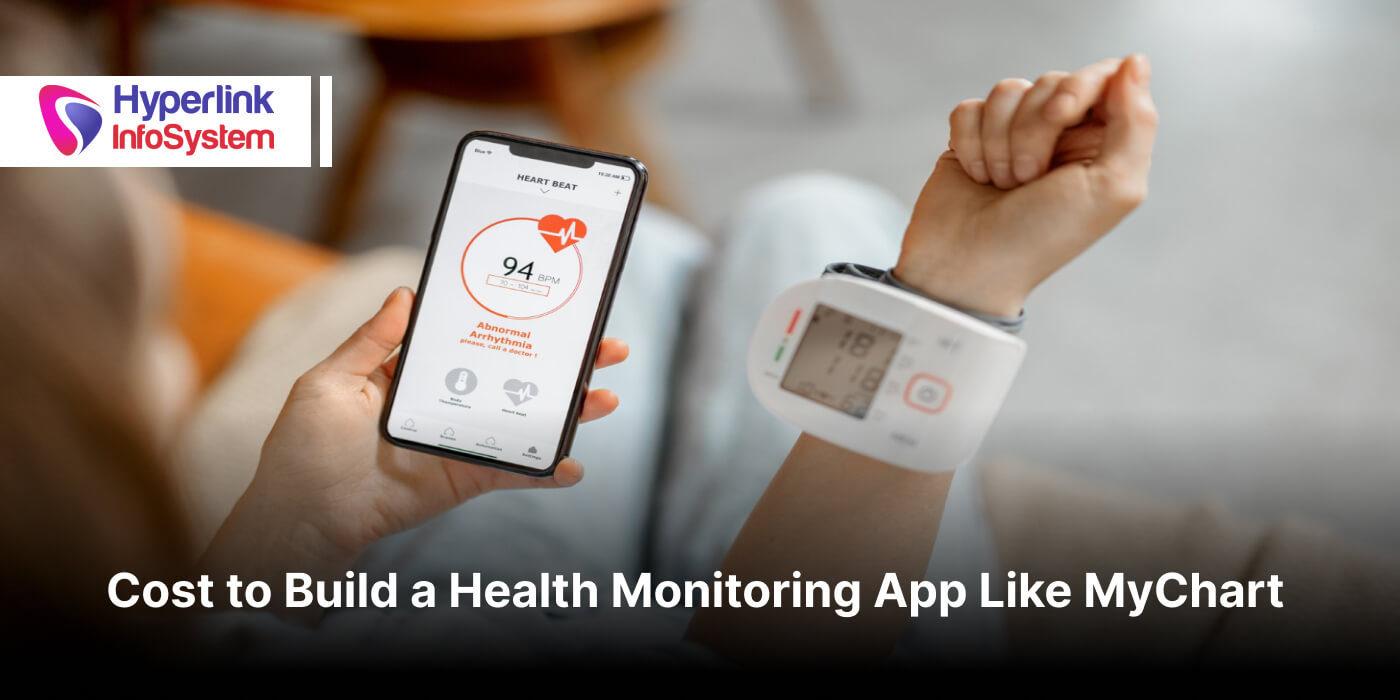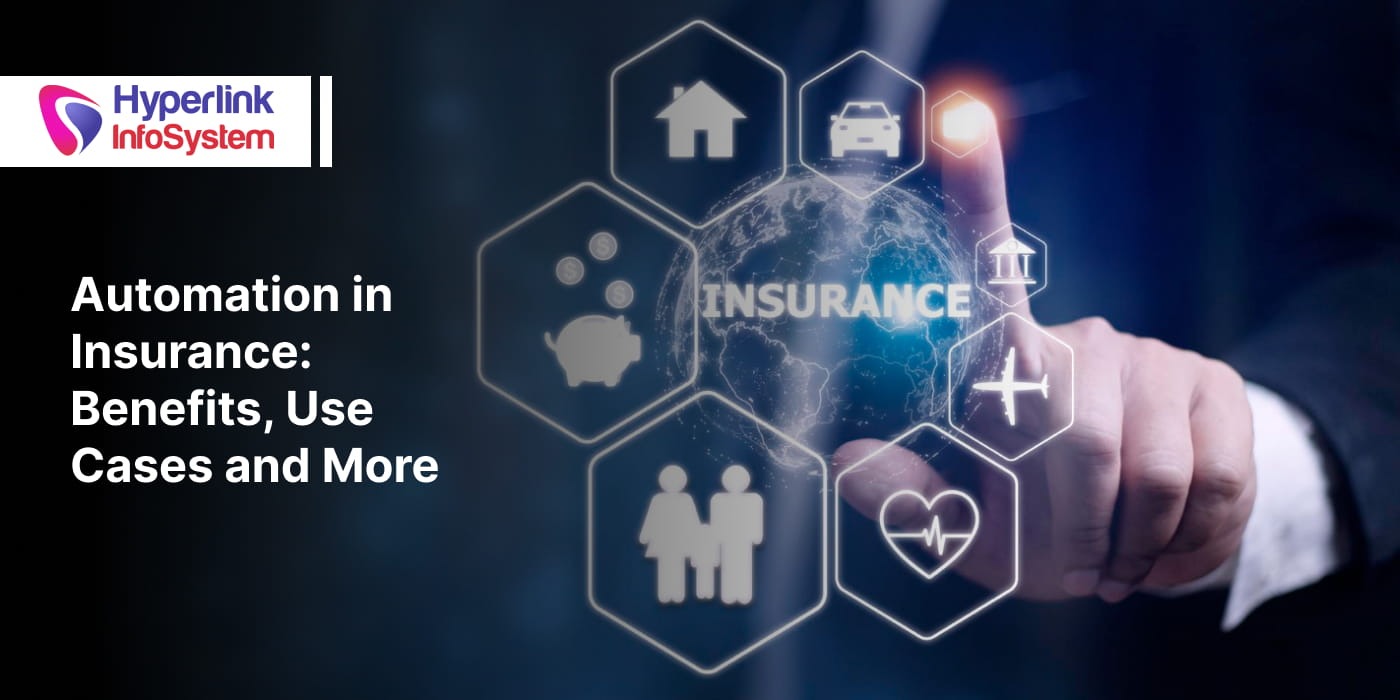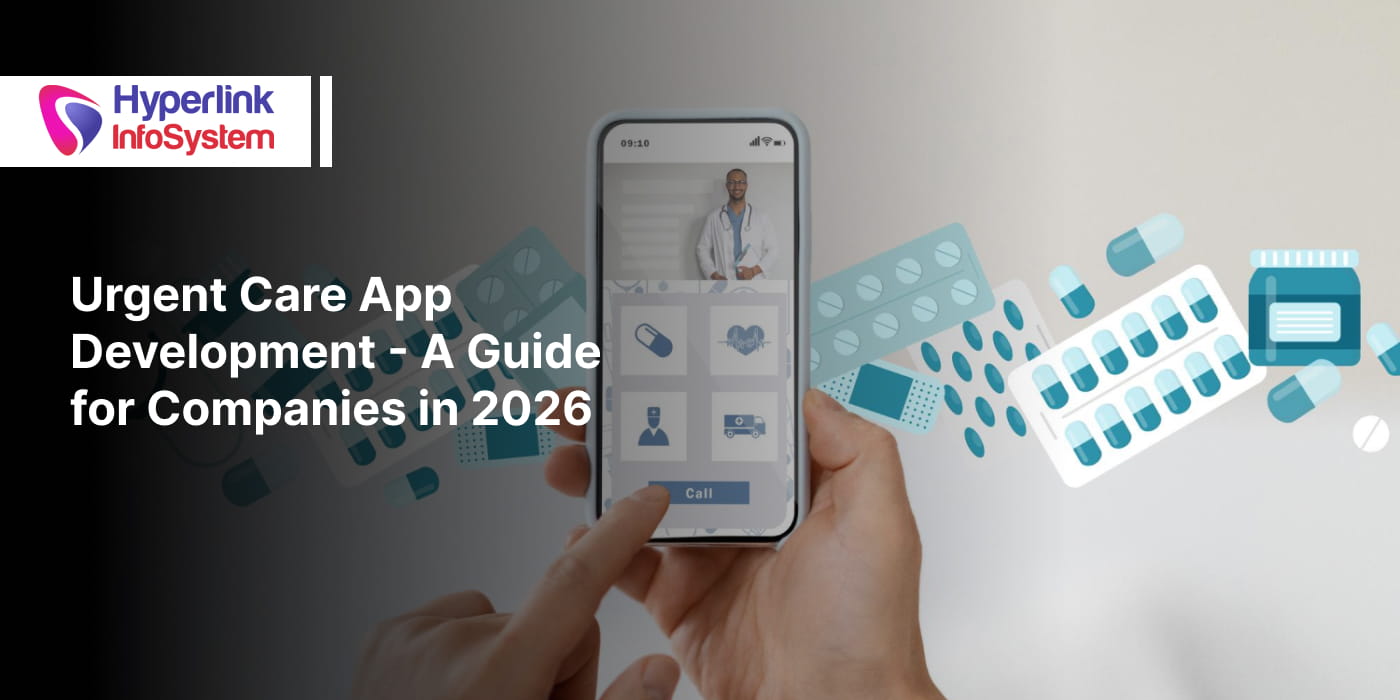Cost to Develop a Health Monitoring App Like MyChart in 2025
Aug 2025

In a world where it is now nearly impossible to survive without mobile applications in this competitive market. It is no surprise that healthcare has found its digital home, too; a home for patients and healthcare service providers both. With 2025 approaching, health monitoring apps are gaining prominence as they empower patients, streamline medical care, and, most importantly, bridge the gap between healthcare providers and patients. With so many apps available in the market, users now have higher expectations from such health monitoring apps; they want advanced, on-demand, personalized, and transparent healthcare experiences from the app.
MyChart is one such app that has consistently proven itself when it comes to effective digital health solutions, and because of its advanced features, it has set very high standards for other healthcare apps to compete with.
Building a health monitoring app like MyChart with a reliable digital partner can be fruitful, but that brings up a key question: what's the cost to build a health monitoring app like MyChart? In this blog, we'll help you understand the real cost to develop an app like MyChart.
What is MyChart and Why Is It So Popular?
If you’ve ever logged into a medical app to view your test results, message your doctor, or manage appointments with just a few taps, there’s a good chance you’ve already seen the MyChart effect in action.
Developed by Epic Systems, MyChart isn’t just another health app. It’s one of the most trusted and widely used patient engagement platforms in the digital healthcare space today.
MyChart helps patients connect directly with healthcare providers. You can find most of the healthcare services on this app, from electronic health records and bill payments to medication tracking and virtual consultations. It also supports IoT integration so that wearables like smartwatches and fitness bands can help with tracking.
From secure access to medical records to appointment booking, test results, and wearable integration, MyChart is at the forefront of personal health monitoring applications for both patients and providers. Patients can message the doctor, pay bills, and track their health records, all from one dashboard.
Additional conveniences are added for families with proxy access. In essence, it is more than an app-it is a comprehensive digital healthcare companion.
The eventual feature that gives MyChart its distinguishing characteristic is the way it closes the gap between traditional care and modern services. In fact, MyChart leads the cast of healthcare apps that make the provision of healthcare more accessible, personal, and efficient in a setting where virtual care is the new normal.
Its proven track record has set a high standard for anyone interested in healthcare app development services, proving that an app, when fueled with the vision and proper execution, can change our experience of healthcare.
Also Read, How Much Does It Cost to Build an App Like MyFitnessPal?
Key Features of a Health Monitoring App Like MyChart
Here's the list of some key features that are important to have in a health monitoring app like MyCart.
1) Quick and easy sign-up
- Try to use signups that are easy and quick because no one likes the confusing registration when they're trying to check their health records.
2) All your health info, one tap away
- From test results to past prescriptions, the app securely pulls everything together with EHR/EMR integration.
3) Book appointments without calling the clinic
- Pick a date, choose a time, and get it added to your calendar — it’s that simple. You’ll even get a reminder.
4) Directly Communicate with your Doctor
- Need to ask a quick question or have a follow-up after a visit? Message or video call your provider right in the app.
5) Refill meds without the pharmacy runaround
- See what you’re taking, when it’s due for a refill, and request it with just a few taps.
6) Lab results that don’t leave you guessing
- Get notified when results are ready, and view them clearly, no confusing medical jargon, just insights you can actually use.
7) Syncs with the wearable on your wrist
- Whether it’s a Fitbit or Apple Watch, your steps, heart rate, or sleep patterns can help tell the bigger health story.
8) Reminders & Push Notifications
- Missed appointments? Forgotten meds? Not anymore. The app gently nudges you when it’s time to take action.
9) Privacy
- Built to meet all the right standards (think HIPAA and GDPR), so your health info stays exactly where it should — private.
10) Speaks your language — literally
- It offers multilingual support that makes the app user-friendly for everyone.
What Affects the Cost to Build a Health App Like MyChart?
It is very difficult to give an exact, round figure amount as an answer for this question when someone asks, "How much does it cost to build an app like MyCart?" See, it depends on each project's requirements, so here's a breakdown of what actually drives the cost.
- App Complexity and Features
A basic version with just appointment scheduling and notifications will cost a lot less than an app that also pulls in lab results, has secure messaging, video consultations, and syncs with your smartwatch. The more features you want, the more time (and budget) it’ll take.
- Design Requirements
If you want something that’s just functional, that’s one thing. But if you're going for smooth navigation, branded UI, accessibility for seniors, and a great user experience, that adds design time. And design time = dollars.
- Third-Party Integration
Healthcare apps don’t live in a vacuum. If you’re connecting to EHRs, lab systems, health tracking devices, or even insurance providers, expect a fair bit of integration work. Some APIs play nice — others don’t.
- Data security and compliance.
Health apps have a higher bar to clear. You need to follow HIPAA, GDPR, HL7, FHIR — all the regulations that keep patient data safe. It’s non-negotiable and definitely adds to the scope.
- Backend and cloud setup.
This is the core of any app; if you want your app to run smoothly, even though it has multiple users at a time. Servers, strong and secure database, login; everything needs to be rock solid, especially when you're dealing with users' sensitive information.
- iOS, Android, or both?
Building for one platform costs less than building for two. You could go with cross-platform tools like Flutter or React Native to save some time and cost, but even then, it still needs careful testing on both sides. Hire app developers.
- QA & Testing
When it comes to healthcare, there’s zero room for bugs. Your app needs to be rock-solid. That means lots of quality checks — from user experience to security, across devices, screen sizes, and OS versions.
- After launch? You’re not done.
Apps aren’t set-it-and-forget-it. You’ll need updates, maintenance, security patches, and feature upgrades over time. Budgeting for ongoing care is just as important as the launch itself.
- Location & Development Team.
A development team in New York will charge very differently from a team in India. It’s not just about rates, it’s about experience. Choosing a mobile app development company with a healthcare portfolio can save time and avoid costly mistakes.
How Much Does It Cost to Build an App Like MyChart?
For an application like MyChart, the prices vary greatly based on the type of app you want to build. If one is starting with an MVP (minimum viable product), which necessitates very primary features like appointment booking, medical record access, and secure messaging, this can go anywhere between $40,000 and $80,000.
Throw in some advanced features, quite possibly wearable integrations, video consultation, and custom dashboards, and now the ball is in the six-figure zone, washing well past $150,000.
Expect any app that is feature-rich, very much like MyChart, with deep integrations with EHR, multilingual support, and data security, to set beyond the budget of $300,000. Of course, the final cost will also depend on whether the app is built for iOS or Android, or both. And here is a pro tip: look out for app developers for hire very carefully; the right team will be able to help you build a brilliant product without wasting any time or money.
How Hyperlink InfoSystem Can Help You Build a MyChart-like Health Monitoring App
Hyperlink InfoSystem brought to life a host of digital health solutions in collaboration with many healthcare clients across the globe, ensuring they are secure, scalable, and user-friendly. By virtue of our concentrated experience in custom healthcare app development, we know all there is to know about creating an app like MyChart-A-secure EHR/EMR integration system with things such as real-time appointment management and patient communication tools.
Working with technologies like AI, cloud computing, IoT, and wearable integrations, we build smart health monitoring systems for patients and providers alike. HIPAA-, GDPR-, or HL7/FHIR-compliance - whatever the industry must, we make sure that your application is ranked high for security and privacy.
The whole idea is agile; hence, you are involved with the entire process, selected, from concept to launch and then some. Known for innovation and reliability, Hyperlink InfoSystem is the mobile app development company that healthcare practitioners turn to when it comes down to delivering modern solutions that foster care and patient engagement.
The capabilities of our organization worked out so well in a full-fledged patient engagement and health tracking app developed for our client in the global health space. The app assured secure access to electronic medical records, appointment scheduling, and management on the patient side, refilling of prescriptions, and communications with providers over secure chat.
Integration was performed on EHR back-end systems using HL7 and FHIR standards that allow seamless data exchange to occur across systems. In addition, the app was capable of integrating with wearables to gather vital data in real-time, such as heart rate, sleep, and physical activity, which would help both patients and doctors understand trends in health.
From a technical perspective, with the platform fully HIPAA compliant and built with state-of-the-art encryption mechanisms, not only did the engagement increase patient satisfaction and engagement levels, but also the provider's efficiency in operation and care delivery. This project is one of the strongest implementations explaining how Hyperlink InfoSystem brings MyChart-like experiences alive with an in-depth conception of healthcare technology.
Also Read, Mobile App Development Cost in Kuwait : Factors, Challenges, Best Practices & More
Tips to Reduce App Development Costs Without Compromising Quality
- Start Small, Think Big: Don’t try to build the full app on day one. Begin with just the must-have features, launch it, and then add more as users engage. This phased approach saves money and minimizes risk.
- One Codebase, Two Platforms: Instead of building separate apps for iOS and Android, consider frameworks like Flutter. It’s faster, cheaper, and good enough for most healthcare app needs.
- Don’t Reinvent the Wheel: A lot of features like chat, notifications, and calendar syncing already have trusted libraries and APIs. Use them. Custom is great, when it’s really needed.
- Pick the Right Tech Partner: Choosing an offshore company with solid healthcare app experience (and good reviews!) can drastically reduce costs without sacrificing quality or compliance.
- Plan for After Launch Too: Your job is not finished once the app is launched; you're just getting started. Many latest updates, bug fixes, and customer support requests are coming your way. Partner with a company that provides ongoing support too.
Conclusion
Developing a health monitoring app like MyChart is not a typical, ready-made project with different features you want to have, with its own choice of technology stack, set of working people, and long-term goal. Your app will make a difference in the market when you align with the right development partner for either an MVP or a full-blown, feature-full digital health platform.
At the core, success is not about code alone; it is about building an app that is secure, user-friendly, and scalable, and is helpful in bridging the provider-and-patient gap.
Are you ready to build your healthcare app now?
Reach out to Hyperlink InfoSystem and share for a tailored quote for building a health monitoring solution that sits alongside famous names like MyChart.
Frequently Asked Questions
Absolutely. Many a healthcare provider would like a solution that contains only the features they need—for example, scheduling an appointment, sending secure messages, or accessing medical records. This keeps the app more focused and user-friendly; besides, the development costs are also reduced.
The timeline depends on app scope and complexity. A barebones version, with all the basic features, takes between 3 and 5 months. An enterprise-grade health app carries more features and, therefore, may take 6 to 9 months, or perhaps much longer. However, you can always cut down the timeframe with the right planning and an experienced team.
With a custom-built solution, the healthcare provider usually owns and controls all data. It is important to look for developers who guarantee data security and comply with local healthcare regulations, along the lines of HIPAA or GDPR, depending on where you are.
Latest Blogs

Is BlockChain Technology Worth The H ...
Unfolds The Revolutionary & Versatility Of Blockchain Technology ...


IoT Technology - A Future In Making ...
Everything You Need To Know About IoT Technology ...

Feel Free to Contact Us!
We would be happy to hear from you, please fill in the form below or mail us your requirements on info@hyperlinkinfosystem.com
Hyperlink InfoSystem Bring Transformation For Global Businesses
Starting from listening to your business problems to delivering accurate solutions; we make sure to follow industry-specific standards and combine them with our technical knowledge, development expertise, and extensive research.
4500+
Apps Developed
1200+
Developers
2200+
Websites Designed
140+
Games Developed
120+
AI & IoT Solutions
2700+
Happy Clients
120+
Salesforce Solutions

40+
Data Science

















